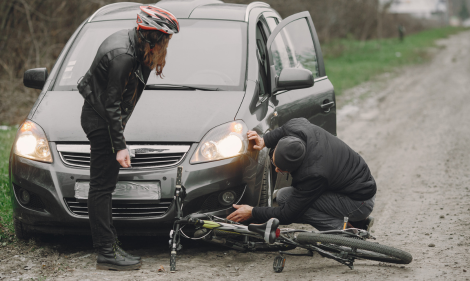A car accident can turn life upside down in seconds. While some people walk away with minor bruises, others face pain that refuses to fade—weeks or even months later. Whether it’s a stiff neck, an aching back, or nerve pain that flares unexpectedly, lingering discomfort can be both frustrating and concerning. At Specialty Care Clinics, we help Texas patients understand why some injuries take longer to heal and what you can do to promote a full recovery.

1. The Hidden Complexity of Auto Injuries
Not all car accident injuries are visible right away. Many involve soft tissue damage, micro-tears in muscles, or nerve compression that may take days to develop noticeable symptoms. Whiplash, for example, can appear mild initially but cause chronic neck pain and headaches if untreated. Similarly, spinal misalignment or disc herniation may worsen over time, extending the healing process.
Your body’s natural inflammatory response also plays a role. While inflammation helps repair tissue, too much of it can delay recovery and cause prolonged pain or stiffness.
2. Factors That Slow the Healing Process
Several factors influence how quickly your body recovers after a crash:
- Severity of the impact: High-speed collisions or multiple points of impact can lead to deeper internal damage.
- Age and overall health: Healing naturally slows with age, and chronic conditions like diabetes or arthritis can further affect recovery.
- Delayed treatment: Waiting too long to seek medical help allows minor injuries to progress into major issues.
- Lifestyle habits: Poor posture, lack of rest, smoking, and skipping physical therapy can significantly slow healing.
- Psychological stress: Anxiety and emotional trauma can amplify physical pain and hinder the body’s ability to repair itself.
At Specialty Care Clinics, our providers assess these factors during your evaluation to create a personalized treatment plan for optimal recovery.
3. Common Long-Lasting Auto Accident Injuries
Some injuries are simply more prone to slow recovery. These include:
- Whiplash and neck sprains: Damage to ligaments and muscles around the cervical spine can take weeks to heal, especially if not stabilized early.
- Back and spinal injuries: Herniated discs or misalignments often require extended rehabilitation.
- Nerve damage: Nerves heal slowly—sometimes taking months to regenerate.
- Joint injuries: Shoulders, knees, and wrists can develop chronic pain due to overuse or incomplete recovery.
- Soft tissue damage: Strains, sprains, and contusions can remain tender long after bones and skin appear normal.
4. The Importance of Post-Accident Care
Even if you feel “fine” after a crash, a comprehensive medical assessment is essential. Early intervention helps prevent chronic pain syndromes and long-term disability. Our clinic offers:
- Diagnostic imaging to detect hidden injuries
- Pain management therapies, including non-invasive options
- Chiropractic care to restore proper spinal alignment
- Physical therapy for strength, flexibility, and mobility
- Regenerative treatments that support natural healing
Our goal is to address the root cause of your discomfort, not just mask symptoms.
5. Healing Takes Time—But You’re Not Alone
Every patient heals at a different pace. What’s most important is consistency—following your treatment plan, attending physical therapy, and maintaining healthy habits. Regular check-ins with your care team at Specialty Care Clinics ensure progress is monitored and treatments are adjusted to meet your needs.
We believe recovery is more than just physical—it’s emotional and mental, too. That’s why our compassionate providers focus on whole-person care to help you regain control of your life after a crash.
Conclusion
Lingering pain after a car accident doesn’t mean your body has failed—it means it needs more support. With the right combination of medical treatment, rehabilitation, and time, you can return to an active, pain-free life. Don’t wait for the pain to become unbearable—reach out to Specialty Care Clinics today for expert evaluation and care tailored to your recovery journey.
FAQs
- Why does pain sometimes appear days or weeks after a car accident?
Some injuries, such as whiplash, soft tissue damage, or internal bruising, take time to manifest symptoms. Inflammation and muscle stiffness can build gradually, making discomfort noticeable only after a few days. That’s why early evaluation at a clinic like Specialty Care Clinics is essential—even if you feel fine right after the crash. - How long does it typically take to recover from a car accident injury?
Recovery time varies based on the type and severity of the injury, your age, and your overall health. Minor soft tissue injuries may improve in a few weeks, while more complex cases like spinal or nerve damage can take months. Regular follow-ups and consistent therapy help shorten recovery time. - What treatments help with lingering pain after an accident?
At Specialty Care Clinics, we offer a full range of treatments including pain management, physical therapy, chiropractic care, and regenerative medicine. Our specialists design customized plans to target the root cause of your pain—so you can heal completely, not just temporarily feel better. - Can stress or anxiety make post-accident pain worse?
Yes. Emotional trauma and stress can heighten your body’s pain response, making symptoms feel more intense. Chronic stress can also slow down physical recovery. Our team takes a whole-body approach—addressing both mental and physical healing to help patients recover fully after an accident. - When should I seek medical help for lingering pain after a car accident?
If pain lasts more than a few days or interferes with daily activities, schedule a visit immediately. Delaying treatment can lead to chronic pain or long-term damage. Specialty Care Clinics offers complete diagnostic testing and personalized care for auto accident survivors across Texas.
